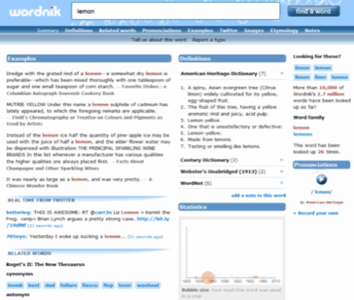We just came acrossWordnik, a very cool alternative to traditional dictionary sites like Dictionary.com or Merriam-Webster‘s web site. On one page, Wordnik displays a word’s definition, pronunciation, synonyms, antonyms, a word’s etymology, and stats about how often a word was used. Registered users can also add their own lists of synonyms and related words to the site (registration is free). The site’s design could still use a bit of refinement, but in terms of its features, Wordnik comes close to beating out most other traditional dictionary sites.

Words in Context
One of the nicest features of Wordnik is that it will show the word you are looking for in context as well. Wordnik curates a large archive of blog posts, web sites, and newspaper and magazine archives, as well as out-of-copyright books from Project Gutenberg. The site will also display the most recent messages on Twitter that used the word you are looking for.

1.7 Million Words
Wordnik currently gets its definitions from sites like the American Heritage Dictionary, WordNet, and the GNU version of The Collaborative International Dictionary of English. Synonyms and antonyms (besides user-submitted ones) come from Reogat’s New Thesaurus and Allen’s Synonyms and Antonyms.
In an interview with Caroline McCarthy, Wordnik’s CEO, Erin MCKean points out that Wordnik’s database currently includes about 1.7 million words (in total, including examples, the service claims to have collected more than 4 billion words), and that the company is working on smartphone apps, an API for developers, and a kid-friendly version of the site. Wordnik just launched yesterday, but the service already looks like a great alternative to more established dictionary sites, and we would recommend that you give it a try the next time you are about to head to dictionary.com.
Tip of the hat to the good folks at Lifehacker for pointing us to this service.

















